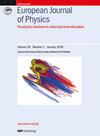水从漏斗流出
IF 0.8
4区 教育学
Q4 EDUCATION, SCIENTIFIC DISCIPLINES
引用次数: 0
摘要
利用伯努利非稳态方程,以数值形式确定了从锥形管中流出的水的表面高度和速度分布与时间的函数关系。计算出的速度介于半径恒定的圆柱形管道的自由落体和具有小出口孔的漏斗的托里切利定律之间。此外,还利用牛顿第二定律计算了固定锥形容器所需的外力,包括水流出漏斗所产生的火箭推力。与底面有孔的直圆柱形水箱的流过力和固定力的类似表达式进行了比较。该演示文稿的水平适合以微积分为基础的力学物理本科课程,其中包括流体动力学模块。本文章由计算机程序翻译,如有差异,请以英文原文为准。
Flow of water out of a funnel
The unsteady Bernoulli equation is used to numerically determine the surface height and velocity distribution of water flowing out of a conical tube as a function of time. The speed is found to interpolate between freefall for a cylindrical pipe of constant radius and Torricelli’s law for a funnel having a small exit hole. In addition, the applied force needed to hold the conical vessel in place is calculated using Newton’s second law including the rocket thrust due to the water flowing out of the funnel. A comparison is made with the analogous expressions for the flow through and holding force on a right cylindrical tank having a hole in its bottom face. The level of presentation is appropriate for an undergraduate calculus-based physics course in mechanics that includes a module on fluid dynamics.
求助全文
通过发布文献求助,成功后即可免费获取论文全文。
去求助
来源期刊

European Journal of Physics
物理-物理:综合
CiteScore
1.70
自引率
28.60%
发文量
128
审稿时长
3-8 weeks
期刊介绍:
European Journal of Physics is a journal of the European Physical Society and its primary mission is to assist in maintaining and improving the standard of taught physics in universities and other institutes of higher education.
Authors submitting articles must indicate the usefulness of their material to physics education and make clear the level of readership (undergraduate or graduate) for which the article is intended. Submissions that omit this information or which, in the publisher''s opinion, do not contribute to the above mission will not be considered for publication.
To this end, we welcome articles that provide original insights and aim to enhance learning in one or more areas of physics. They should normally include at least one of the following:
Explanations of how contemporary research can inform the understanding of physics at university level: for example, a survey of a research field at a level accessible to students, explaining how it illustrates some general principles.
Original insights into the derivation of results. These should be of some general interest, consisting of more than corrections to textbooks.
Descriptions of novel laboratory exercises illustrating new techniques of general interest. Those based on relatively inexpensive equipment are especially welcome.
Articles of a scholarly or reflective nature that are aimed to be of interest to, and at a level appropriate for, physics students or recent graduates.
Descriptions of successful and original student projects, experimental, theoretical or computational.
Discussions of the history, philosophy and epistemology of physics, at a level accessible to physics students and teachers.
Reports of new developments in physics curricula and the techniques for teaching physics.
Physics Education Research reports: articles that provide original experimental and/or theoretical research contributions that directly relate to the teaching and learning of university-level physics.
 求助内容:
求助内容: 应助结果提醒方式:
应助结果提醒方式:


